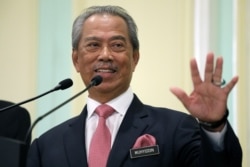Malaysian opposition leader Anwar Ibrahim's bold claim last week that he has forged a solid majority in parliament to back his latest bid for prime minister has jolted the country's jittery new government.
It remains to be seen whether the seasoned statesman will seize the top job after a rollercoaster career, or if he is playing another weak hand doomed to fail.
"The question really that people ask now is: Will he be another of the Malaysian leaders that never made it to PM or will he be able to achieve it?" said Bridget Welsh, an honorary research associate with the University of Nottingham's Asia Research Institute in Malaysia.
"Anwar Ibrahim has had many political lives; he cannot be ruled out as a political figure," she said. "But I think that the last weeks have not necessarily helped his political fortunes."
Anwar, president of the opposition Parti Keadilan Rakyat, claimed to have mustered the support of a "strong, formidable majority" of lawmakers to wrest control from Prime Minister Muhyiddin Yassin and form a new government at a press conference in the capital, Kuala Lumpur, on Sept. 23.
To pull it off he must convince Malaysia's king, Sultan Abdullah Sultan Ahmad Shah, who has the right by law to replace prime ministers if he believes an incumbent has lost control of the 222-seat parliament to a contender. The two were to meet on Sept. 22, but the royal palace called it off, claiming the king was ill. The palace later said the king was recovering from food poisoning and a sporting injury and would not be granting any audience until at least this coming Friday.
At the prime minister's urging, the king could also, once back to work, dissolve parliament, triggering a general election.
It would hardly be Anwar's first.
A rough ride
Now 73, Anwar cut his political teeth as a student radical in the 1970s before joining the country's dominant party, the United Malays National Organization, in 1982. There he rose quickly through the ranks, holding several cabinet posts before landing next to then-Prime Minister Mahathir Mohamad as his deputy and widely regarded heir-apparent.
But the pair fell out over how to cope with the financial crisis that slammed Asia in 1997. Anwar was sacked the next year and launched Reformasi, a popular protest movement aimed at driving corruption and cronyism out of Malaysian politics.
He soon found himself under arrest, convicted of sodomy and sentenced to nine years in jail. Anwar maintained his innocence, and the Supreme Court overturned the conviction in 2004, setting him free.
Back to leading the political charge against UMNO, Anwar was again sued for sodomy in 2008 and cleared in 2012, only the have a court overturn the acquittal in 2014 and send him back to jail.
From behind bars, Anwar's fortunes turned once more when he and Mahathir, who had retired in 2003, agreed to set their differences aside for a successful challenge of UMNO's increasingly corruption-mired government in the 2018 general election.
Back in the prime minister's seat, Mahathir made good on his promise to win Anwar a pardon but dithered on another pledge to hand him the job after two years. In February 2020, before the two years were up, Mahathir's interior minister, Muhyiddin, helped orchestrate a power grab that saw him appointed prime minister by the king, bringing UMNO back to power and once again blocking Anwar's path to the top.
But analysts say Anwar has proven himself a political survivor time and again.
Ahmad Martadha Mohamed, a government professor at Utara Malaysia University, credits the Islamic credentials Anwar earned as a student activist in the Muslim-majority country and the work he later put in mentoring political protégés and traveling state to state to make sure his allies held key party posts.
Like others, though, Ahmad gives much of the credit to Anwar's natural charisma and rhetorical gifts.
"His skills in terms of public speaking, nobody can argue [with] that. He has that commanding presence when he speaks in front of the general public, so he tends to attract a lot of people," he said. "That's why ... after 1998, you know, when this Reformasi movement took place, he was able to galvanize support from the regular people."
Analysts aren't yet convinced, though, that all of it will be enough for Anwar to pull off his latest gambit.
Power games
For one, Anwar is drawing on a losing playbook. He has claimed to have won over a majority of lawmakers to back his bid for prime minister on three other occasions over the years, failing to succeed each time.
Anwar has yet to name any of the lawmakers or parties that would ditch Muhyiddin to back him this time, and some have come out to quash any speculation that it might be them, noted James Chin, director of the University of Tasmania's Asia Institute. UMNO President Ahmad Zahid Hamidi told local media that some of his party members have expressed support for Anwar but made no mention of who or how many.
Elections in Sabah state this past Saturday may have hurt Anwar's chances, too. Parties in or aligned with Muhyiddin's ruling national coalition won most of the 73 seats in the local legislature up for grabs. Chin said that bolsters Muhyiddin's hold on the prime minister's office and will make any lawmakers who may have been thinking of leaving him for Anwar less likely to take the leap.
Welsh, of Nottingham University, said the Sabah poll will have only bought Muhyiddin a little more time at best, with pressure for a general national election mounting on his "back door" government, not least from UMNO.
Though back in the majority, UMNO has shown signs of chafing for having to share power with Muhyiddin's smaller party, Bersatu. Welsh said UMNO reckons it could win back the dominant position it held for decades up to its surprise defeat in 2018 if a snap election were called and may have floated the specter of members switching sides just to bring one on by making Muhyiddin look weak.
"They [UMNO] want to return back to a hegemonic position of political power where they're completely in control, and they think the elections can get them there. And what better way to do that than weaken and destabilize the Muhyiddin government?" she said. "And how do you do that? You use Anwar to do that."
If Anwar truly does have the numbers in parliament to best Muhyiddin, as he claims, he'll need to convince the king before that happens. There are no guarantees the king will even grant him an audience.
But should all the pieces fall into place and land Anwar the job he has been after for decades over a long and winding career, Ahmad said it would be nothing short of a "miracle."
"It would be the greatest comeback in Malaysian history," said Chin, "like Rocky."










